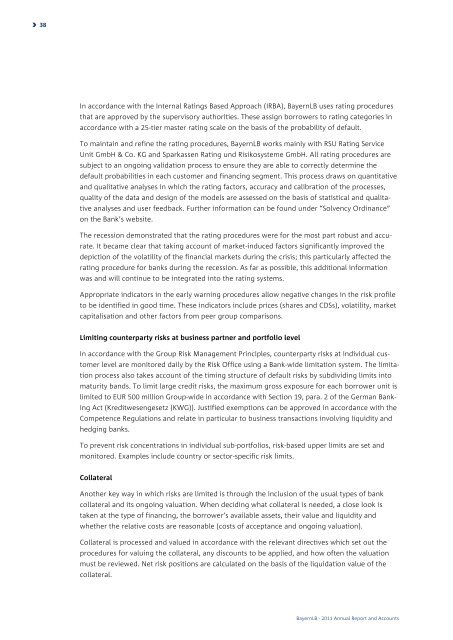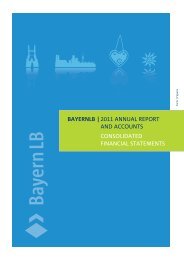Annual Report 2011 (separate financial statements)
Annual Report 2011 (separate financial statements)
Annual Report 2011 (separate financial statements)
Create successful ePaper yourself
Turn your PDF publications into a flip-book with our unique Google optimized e-Paper software.
› 38<br />
In accordance with the Internal Ratings Based Approach (IRBA), BayernLB uses rating procedures<br />
that are approved by the supervisory authorities. These assign borrowers to rating categories in<br />
accordance with a 25-tier master rating scale on the basis of the probability of default.<br />
To maintain and refine the rating procedures, BayernLB works mainly with RSU Rating Service<br />
Unit GmbH & Co. KG and Sparkassen Rating und Risikosysteme GmbH. All rating procedures are<br />
subject to an ongoing validation process to ensure they are able to correctly determine the<br />
default probabilities in each customer and financing segment. This process draws on quantitative<br />
and qualitative analyses in which the rating factors, accuracy and calibration of the processes,<br />
quality of the data and design of the models are assessed on the basis of statistical and qualitative<br />
analyses and user feedback. Further information can be found under “Solvency Ordinance”<br />
on the Bank’s website.<br />
The recession demonstrated that the rating procedures were for the most part robust and accurate.<br />
It became clear that taking account of market-induced factors significantly improved the<br />
depiction of the volatility of the <strong>financial</strong> markets during the crisis; this particularly affected the<br />
rating procedure for banks during the recession. As far as possible, this additional information<br />
was and will continue to be integrated into the rating systems.<br />
Appropriate indicators in the early warning procedures allow negative changes in the risk profile<br />
to be identified in good time. These indicators include prices (shares and CDSs), volatility, market<br />
capitalisation and other factors from peer group comparisons.<br />
Limiting counterparty risks at business partner and portfolio level<br />
In accordance with the Group Risk Management Principles, counterparty risks at individual customer<br />
level are monitored daily by the Risk Office using a Bank-wide limitation system. The limitation<br />
process also takes account of the timing structure of default risks by subdividing limits into<br />
maturity bands. To limit large credit risks, the maximum gross exposure for each borrower unit is<br />
limited to EUR 500 million Group-wide in accordance with Section 19, para. 2 of the German Banking<br />
Act (Kreditwesengesetz (KWG)). Justified exemptions can be approved in accordance with the<br />
Competence Regulations and relate in particular to business transactions involving liquidity and<br />
hedging banks.<br />
To prevent risk concentrations in individual sub-portfolios, risk-based upper limits are set and<br />
monitored. Examples include country or sector-specific risk limits.<br />
Collateral<br />
Another key way in which risks are limited is through the inclusion of the usual types of bank<br />
collateral and its ongoing valuation. When deciding what collateral is needed, a close look is<br />
taken at the type of financing, the borrower’s available assets, their value and liquidity and<br />
whether the relative costs are reasonable (costs of acceptance and ongoing valuation).<br />
Collateral is processed and valued in accordance with the relevant directives which set out the<br />
procedures for valuing the collateral, any discounts to be applied, and how often the valuation<br />
must be reviewed. Net risk positions are calculated on the basis of the liquidation value of the<br />
collateral.<br />
BayernLB . <strong>2011</strong> <strong>Annual</strong> <strong>Report</strong> and Accounts




